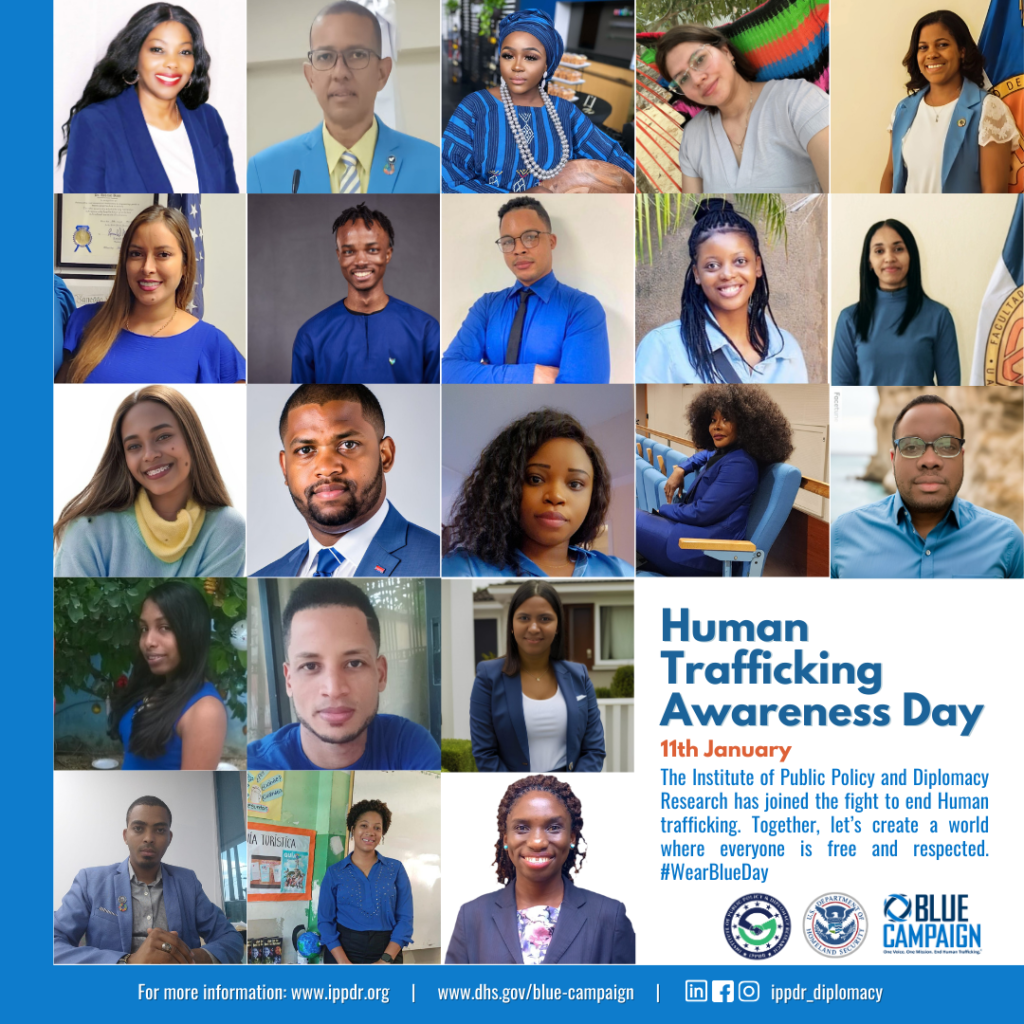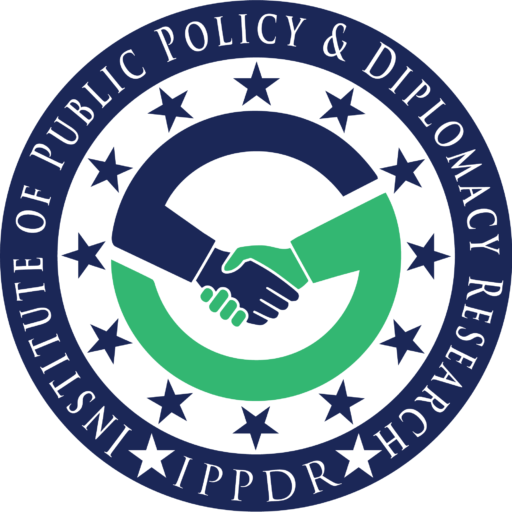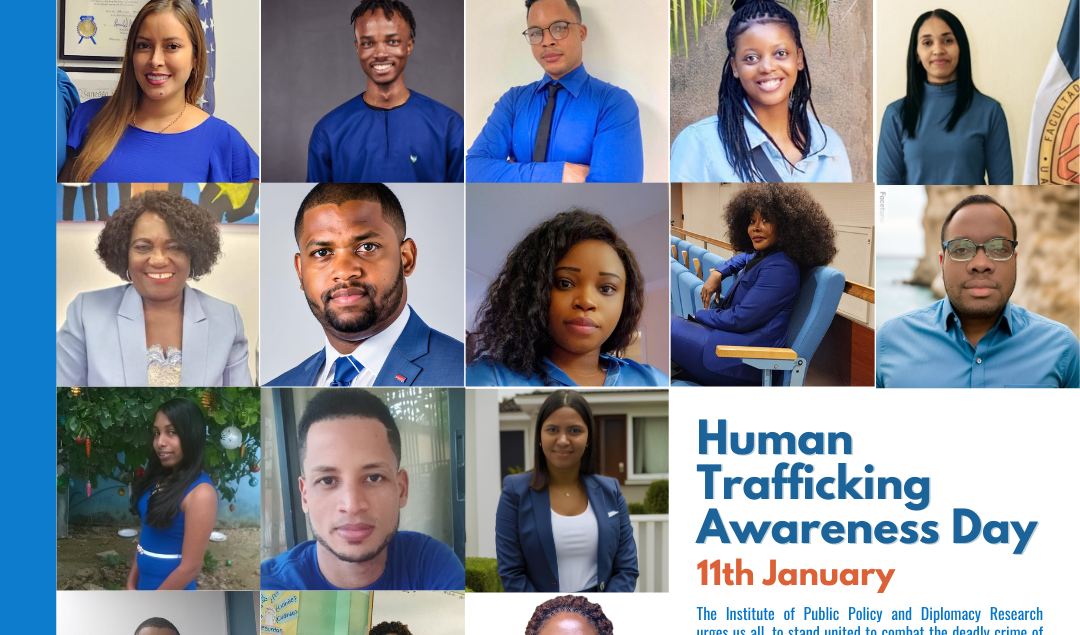Human Trafficking: A Human Rights Crisis and the Institute of Public Policy and Diplomacy Research’s Commitment to the Blue Campaign
Human trafficking stands out as one of the most severe infringements on human rights in contemporary times. It deprives people of their freedom, security, and self-respect, making them susceptible to exploitation through forced labor, sexual slavery, and various cruel circumstances. This worldwide crisis demands urgent and unified efforts to safeguard the at-risk and dismantle the structures that sustain trafficking.

The Institute of Public Policy and Diplomacy Research (IPPDR) reaffirms its commitment to the Blue Campaign as part of its mission to address human rights violations. The Institute aims to educate, advocate, and take meaningful steps toward ending this crime by integrating anti-trafficking efforts into its human rights training assessments.
Understanding the Scope of Human Trafficking
A Global Crisis
Human trafficking is a $150 billion criminal industry that affects an estimated 27.6 million people globally, according to the International Labour Organization (ILO). Women and girls account for a staggering 71% of victims, and children are frequently forced into labor, sexual exploitation, or even used as child soldiers.
The U.S. Context
In the United States, the National Human Trafficking Hotline documented over 16,600 cases in 2022, impacting nearly 25,000 victims. The majority of these cases involved sex trafficking, but labor trafficking remains prevalent in industries such as agriculture, domestic work, and hospitality. Traffickers exploit systemic vulnerabilities, including poverty, immigration status, and lack of access to resources.
Human Trafficking as a Human Rights Violation
Human trafficking undermines fundamental human rights:
Freedom: Trafficking enslaves individuals, stripping them of autonomy and control over their lives.
Safety and Security: Victims endure physical, emotional, and psychological abuse, often with no means of escape.
Fair Work and Wages: Forced labor denies individuals the right to just compensation and humane working conditions.
Despite global recognition of trafficking as a human rights crisis, systemic inequalities, corruption, and limited awareness perpetuate the problem.
The Role of Awareness and Prevention
Recognizing the Signs
Combating trafficking begins with vigilance. Key indicators include:
Restricted movement or controlled communication.
Signs of physical abuse, malnourishment, or neglect.
A lack of personal identification or documentation.
An individual being closely monitored or controlled by another person.
Practical Steps for Safety
Education: Understanding trafficking tactics is essential to recognizing risks.
Online Safety: Social media platforms are often exploited by traffickers. Avoid sharing personal information with strangers.
Travel Precautions: Inform trusted individuals about travel plans and maintain communication.
Empowering Youth: Teach children about personal safety and the relevance of reporting suspicious behavior.
Reporting Suspicious Activity
If you suspect trafficking, act immediately: Call 1-888-373-7888 or text HELP or INFO to BeFree (233733) to report suspected human trafficking to the National Human Trafficking Hotline (NHTH), which takes calls from victims and survivors of human trafficking and those who may know them.
Call 1-866-347-2423 to report suspected human trafficking to the Homeland Security Investigations (HSI) Tip Line 24 hours a day, 7 days a week, every day of the year.
Call 1-800-THE-LOST (1-800-843-5678) or go to CyberTipline.org to report suspected child sex trafficking, sextortion, online enticement, and sexual abuse material to the National Center for Missing and Exploited Children (NCMEC). In emergencies, call 911 to report immediate danger.
The Blue Campaign and IPPDR’s Pledge
The Blue Campaign, led by the U.S. Department of Homeland Security, is a vital initiative that raises awareness and equips communities to combat human trafficking. We are proud to align our human rights training assessments with the goals of the Blue Campaign. This partnership underscores our commitment to:
Education: Delivering comprehensive training to identify and prevent trafficking.
Advocacy: Amplifying the voices of survivors and raising public awareness.
Collaboration: Partnering with law enforcement, nonprofits, and international organizations to strengthen anti-trafficking measures.
A Call to Action
Human trafficking is not an isolated issue; it is a global crisis that affects every community. We urge individuals, organizations, and governments to join the fight against trafficking. By supporting initiatives like the Blue Campaign, recognizing the signs of trafficking, and taking proactive steps to protect vulnerable populations, we can collectively work to end this atrocity.
Together, we can uphold the principles of human rights, ensuring freedom, safety, and dignity for all.


1 Comment
Join the discussion and tell us your opinion.
J’ai eu la chance de suivre le programme Gysil grâce à l’ippdr.
Une expérience enrichissante , et des intervenants avec des compétences variées. J’ai appris énormément sur plusieurs thématiques ( droits de l’homme, consolidation de la paix,médiation, diplomatie , leadership, etc)
Je recommande les formations de l’institut pour toutes les personnes qui ont envie de faire partie des leaders de ce monde .
Dr Andrise Bass et son équipe font un travail remarquable et sont toujours disponible pour les étudiants.